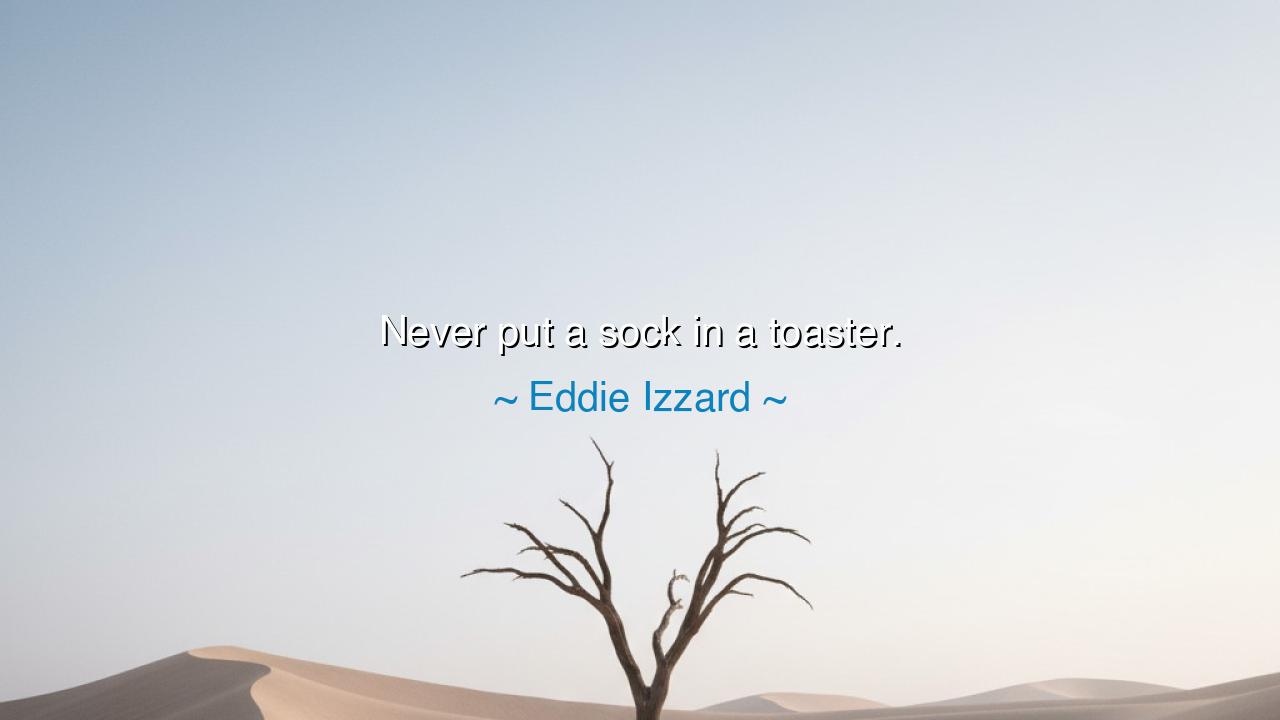
Never put a sock in a toaster.






"Never put a sock in a toaster." – Eddie Izzard
In the great flow of human experience, there exist moments of profound simplicity, where truth is found not in the complex or the grand, but in the very basics of life. The words of Eddie Izzard, in their whimsical absurdity, carry with them an underlying wisdom that speaks to the dangers of ignorance, recklessness, and carelessness. The seemingly innocuous action of placing a sock into a toaster—a task so ridiculous that one might easily laugh it off—reveals, at its core, the deeper human tendency to act without thought, to ignore the consequences of our actions, and to disregard the tools and systems that shape our world. The sock in the toaster represents a moment of misplaced action, a metaphor for those times when we fail to recognize the proper way to interact with the world around us.
Consider, in ancient times, how the great philosophers and scholars of the world sought to understand the importance of balance and wisdom in their actions. Socrates himself would often caution his followers not to act in haste, but to reflect deeply on their intentions before taking any step. The human impulse, unchecked by reason or understanding, can lead to great folly, as in the example of the sock in the toaster. What seems harmless at first—what seems even humorous—can have far-reaching consequences if not done with care. Izzard's quote, though wrapped in humor, serves as a reminder of the importance of awareness in our actions and the wisdom of knowing when to hold back, when to pause, and when to step forward.
In the ancient world, the concept of hubris was often linked to those who acted without understanding, thinking they could control forces greater than themselves. Icarus, in his flight toward the sun, represents the tragic tale of human overreach, of acting without the knowledge of one’s true limits. Just as Icarus ignored the wisdom of his father’s warning and flew too close to the sun, so too do we sometimes act without fully understanding the systems around us, placing a sock into a toaster and causing unforeseen consequences. The foolishness of such an action may seem trivial, yet in its deeper context, it speaks to the dangers of ignorance—of rushing into actions without pausing to ask, "What could go wrong?"
History is filled with examples of grand follies born of such impulsive actions—decisions made without understanding, actions taken without care. The fall of Rome was not just the result of external invaders, but of internal decay—a series of missteps and reckless decisions that slowly eroded the strength of an empire. The emperors, once wise and measured, began to act rashly, their actions growing disconnected from the needs of the people. The metaphorical sock in the toaster was the last of many small mistakes that, when piled upon one another, led to disaster. In this sense, Izzard’s humorous warning mirrors a great truth: sometimes it is the small, seemingly insignificant decisions—those made without thought—that lead to the greatest downfall.
In our modern world, where technology and systems shape much of our daily life, the lesson remains timeless. Just as one should never put a sock in a toaster, one must never treat complex systems or processes with a lack of understanding. The devices we use, the relationships we cultivate, and the paths we choose all require a deep respect for their intricacies. The carelessness that Izzard warns against is not only about trivial matters but about the larger forces in our lives that require wisdom to navigate. From the digital age to the decisions we make in our personal lives, we must approach the world with thoughtfulness, remembering that the simplest actions can have lasting consequences if taken without awareness.
Let us then take this lesson into our lives. The world around us is not a collection of tools to be used recklessly, but a complex web of interconnected forces. Before we act, let us pause to ask: Is this the right action? Have we considered the consequences? In doing so, we honor not only our intelligence but our connection to the larger world. Just as the ancient philosophers taught that wisdom is found in understanding, let us seek to understand before we act, to reflect before we speak, and to respect the systems that shape our world.
In the end, Izzard’s quote is more than a humorous piece of advice—it is a reminder to live life with awareness and respect. Let us not be the ones who place the sock in the toaster, but the ones who take the time to understand before we engage with the forces around us. By doing so, we will find not only greater success but also the deeper peace that comes from knowing we have acted with thought and care.






AAdministratorAdministrator
Welcome, honored guests. Please leave a comment, we will respond soon